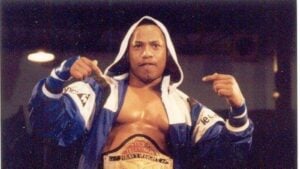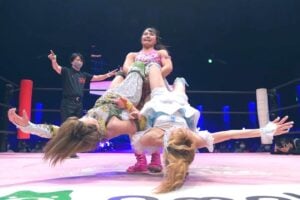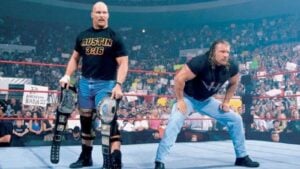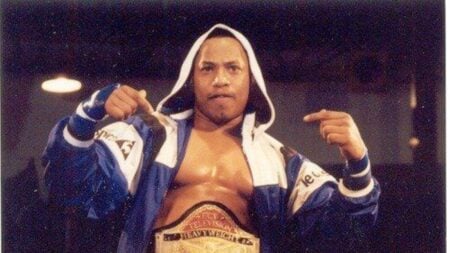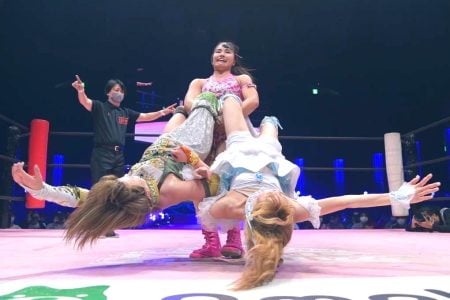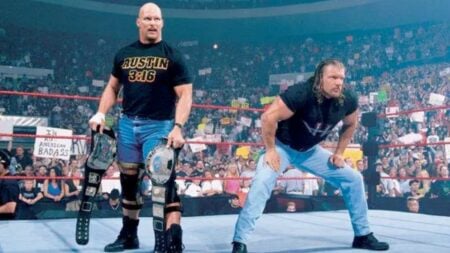It is Saturday, July 14th, 1984, a day that will go down in the annals of Pro Wrestling as ‘Black Saturday.’ You are a pro wrestling fan living in the US Mid-Atlantic.
For the past 12 years, you’ve tuned into Superstation WTBS at 6:00 on Saturday for the weekly 2-hour broadcast of Georgia Championship Wrestling.
This particular Saturday, you turn to WTBS to watch NWA World Championship Wrestling, and almost immediately, you can tell something is wrong.
Black Saturday:
The Prelude To The Monday Night Wars
Instead of being welcomed by nationally renowned pro wrestling commentator Gordon Solie, you are welcomed by somebody you’ve probably never seen before: Vince McMahon.
He explains that he is bringing the World Wrestling Federation to TBS, and he assures you that you’re going to enjoy the WWF just as much as you enjoyed Georgia Championship Wrestling.
Over the ensuing 2 hours, you are ‘treated’ (to put it graciously) to highlights from WWF programming that airs on another network.
Instead of The Road Warriors or Ric Flair, you see WWF Tag Team Champions Adrian Adonis and Dick Murdoch alongside Big John Studd.
You’re used to fast-paced matches with an emphasis on athleticism, not this lumbering fare with cartoonish characters.
What happened to your good ol’ southern ‘rasslin, and when will it be coming back? We’ll answer these questions and more as we look behind the scenes of Black Saturday.
The Players: Ted Turner and GCW

The company ran pro wrestling shows in the Atlanta area before joining the National Wrestling Alliance in 1949, becoming the NWA affiliate for the state of Georgia.
On Christmas Day, 1971, Georgia Championship Wrestling made its television debut with Big Time Wrestling on then-ABC affiliate station WQXI.
The following year, the company would see two major changes. Firstly, they changed their primary venue from the Atlanta Municipal Auditorium to the then-newly built Omni Coliseum.
Secondly, the broadcast rights were bought by upstart media mogul Ted Turner for his new independent UHF station, WTCG. Turner was a longtime pro wrestling fan, and as such, professional wrestling would become a staple of his programming lineup.
He kept production costs low by recording matches at WTCG Studios in front of a small but enthusiastic live audience.
Despite these low production costs, Big Time Wrestling brought in a significant deal of ad revenue for the upstart TV station, often cited as one of the main programs keeping WTCG afloat.
By December of 1975, Turner’s station had become the #1 independent station in the Southeast United States, thanks to cable providers picking up their UHF signal.
The following year, Turner planned to bring WTCG to satellite distributors, effectively becoming a national independent TV station.
By 1978, cable and satellite providers in all 50 states carried Superstation WTCG, reaching 2.3 million viewers nationwide, a figure that would double year-over-year into the 90s.
This development brought Big Time Wrestling (renamed Georgia Championship Wrestling in 1976) to television screens in homes across the nation, becoming the flagship weekly broadcast for the National Wrestling Alliance.
This development riled some of the smaller promoters within the NWA, who claimed that then-owner Jim Barnett was trying to take GCW national.
Barnett countered these claims with his own claim that since he was only using Georgia-based wrestlers, he posed them no threat.
In 1982, at the request of Ted Turner, GCW rebranded to World Championship Wrestling, broadcasting on Saturday evenings on the then-recently rebranded Superstation WTBS.
While Barnett and company weren’t consciously trying to go national, they were about to come head-to-head with somebody who was.
The Players: Vince McMahon and the WWF

The younger McMahon purchased the company with intentions to do something the senior McMahon would never have done: go national.
The advent of cable/satellite TV made it possible for one wrestling promotion to effectively become the only game in town.
But before they could do that, they’d have to weaken their competitors in the NWA. The World Wrestling Federation was born in a breakaway from the NWA in 1963, over disagreements about whether Lou Thesz or Buddy Rogers was World Heavyweight Champion.
However, financial difficulties would bring them back to the NWA in 1971. The junior McMahon would break away from the NWA for the 2nd and final time in 1983, whereupon he purchased some struggling NWA affiliates.
When he encountered promoters who wouldn’t sell, he simply bought their top talent, bringing their fans over to the WWF.
The first weekly WWF television program was Heavyweight Wrestling, taped in front of a live audience in Washington, D.C. and broadcast through syndication in the Northeast.
In 1971, Heavyweight Wrestling was phased out in favor of WWF Championship Wrestling and WWF All-Star Wrestling in 1971, however both programs were still broadcast through syndication.
These were folllowed in 1976 by the launch of WWF on MSG Network, a monthly special broadcasting live from Madison Square Garden.
In 1983, the then-recently rebranded USA Network would reach out to Vince McMahon to fill the 11:00 AM Sunday time slot held by the floundering Southwest Championship Wrestling.
McMahon was only too happy to fill that gap with his own WWF All-American Wrestling. The following year, the WWF would launch pro wrestling-themed variety show Tuesday Night Titans, also on the USA Network.
However, McMahon wasn’t satisfied with just syndication and two slots on the USA Network. If he wanted to go national, he would need a second dependable outlet for his programming.
He approached Ted Turner about buying the World Championship Wrestling time slot, but Turner refused, and McMahon would have to find another way to get his programming on TBS.
The Skullduggery
While it was Ted Turner’s idea to put Georgia Championship Wrestling on cable, he wasn’t yet in control of the outfit.
At the beginning of the 80’s, the major players in the Georgia Championship Wrestling camp were majority owners Jack Brisco, Gerald Brisco, and Jim Barnett. along with head booker Ole Anderson.
However, these four did not represent a united front. The Briscos, Barnett, and the other shareholders were unhappy with Anderson’s booking style and backstage attitude, along with the direction he seemed to be taking the company in.
While GCW was doing good business, but none of the shareholders were making money. McMahon knew about the backstage disputes, and felt like perhaps he could make their little Anderson problem go away.
To that end, Vince McMahon got hold of Jack Brisco, and flew Jack and Gerry to New York that weekend to talk business.
In their secret meeting, Jack Brisco told McMahon that the duo could probably get the other controlling interests in the company to side with them, as nobody was happy with Anderson’s business practices.
Despite wanting to be rid of Anderson, Jack and Gerry Brisco were leary of McMahon’s offer, knowing he planned to go national.
To that end, they shopped around looking for other prospective buyers. They had approached Jim Crockett about purchasing their stock in GCW, but Ole Anderson convinced Crockett that the Briscos were inflating the price of their stocks.
Anderson tried to block the sale, but it was all in vain. Six months after the first meeting between McMahon and the Briscos, the sale had gone through.
The Briscos and Jim Barnett got jobs in the WWF, Paul Jones got a big payoff, Ole Anderson got forced off the board, and Vince McMahon got controlling stake in GCW along with the coveted Saturday night time slot on TBS.
Broadcast and Backlash
After Vince McMahon welcomed viewers to the new World Championship Wrestling, the first match saw WWF Tag Team Champions Adrian Adonis and Dick Murdoch face off against S.D. Jones and Nick DiCarlo.
Over the course of the ensuing hour and a half, there was a promo by Mr Fuji and George “The Animal” Steele, Jesse Ventura vs Chris Curtis, a promo by B. Brian Blair, a promo by Alexis Smirnoff, Iron Sheik vs Ron Hutchison, Big John Studd vs Bobo Brazil, and a promo by Paul Orndorff before Vince McMahon and Freddie Miller close the show.
Throughout the program, there are various promos for WWF magazine and some live events happening well outside of the TBS target market.
This was all quite a departure from what World Championship Wrestling had been just one week earlier. Under the GCW banner, World Championship Wrestling centered on displays of athleticism and technical prowess.
The WWF product, however, was built around a handful of stars wrestling squash matches against enhancement talent.
Making matters worse, WWF programming was designed mainly to appeal to children, with most of the company’s stars working cartoonish gimmicks.
Needless to say, the GCW fanbase were in an uproar almost immediately, calling or writing in to voice their disapproval of this new direction.

Secondly, he had expected the new show to continue the tradition of taping new matches at TBS Studios in Atlanta.
Instead, the new product featured repackaged material that had aired on other WWF programming, along with a handful of fresh matches from house shows at Madison Square Garden.
This was in clear violation of a promise McMahon had made at the time of the sale. Indeed, the WWF wouldn’t start airing matches taped in the studio until March 2nd, 1985.
However, by the time McMahon started to do things Turner’s way, the damage had already been done.
WWF World Championship Wrestling (as the program was renamed in 1985) had been a ratings disaster for the entirety of its existence, and showed no signs of returning to its former glory.
Despite this, Turner couldn’t kick McMahon off his network because there was no written agreement. If Turner wanted to replace the WWF on TBS, he’d have to resort to some trickery of his own.
Turner Fires Back
The lack of a written agreement for WWF to air on TBS meant that Ted Turner had no obligation not to air content from other wrestling promotions.
To that end, Turner struck a deal with Bill Watts’ Mid-South Wrestling to fill the Sunday afternoon timeslot on TBS.
Shortly thereafter, Turner approached Championship Wrestling from Georgia, an NWA-affiliated promotion founded by Ole Anderson after the sale of GCW, about taking over the Saturday morning timeslot.
These two new programs were ratings hits immediately out of the gate, and they made the WWF look even more hokey and cartoonish by comparison.
This was a devastating blow to Vince McMahon, who believed that purchasing GCW would put him in control of all pro wrestling on cable. Losing money, and with a major ratings flop on his hands, McMahon set about selling the company.
Around this time, NWA president Jim Crockett, Jr. was in the process of countering McMahon’s national expansion by unifying the remaining NWA affiliates.
When Vince McMahon tried to sell GCW back to Jim Barnett, he responded by directing him to Crockett, who had recently purchased Championship Wrestling from Georgia.
McMahon and Crockett worked out a $1,000,000 deal that would see Jim Crockett Promotions take over the Saturday evening timeslot, effectively bringing the NWA back to the forefront of wrestling on TBS.
Fans rejoiced as the cartoon world of the WWF was kicked off the network, to be replaced by their beloved studio wrestling in its proper timeslot.
But while this was a big win for Turner, the NWA, and fans of Southern Rasslin’, it wasn’t exactly a loss for the McMahon and the WWF.
The money he earned from the sale of GCW went toward funding the ace McMahon was keeping up his sleeve. The final weeks of WWF World Championship Wrestling were built around hyping up McMahon’s biggest gamble yet: WrestleMania.
Aftermath
Despite WWF World Championship Wrestling being a high-profile ratings disaster, it seemingly had no effect on his other national outlet.
In fact, USA Network gave the WWF another timeslot, airing WWF Prime Time Wrestling on Monday nights. It also set the stage for other promotions to secure cable deals.
In 1985, ESPN brokered a deal with Verne Gagne’s American Wrestling Association, airing AWA Championship Wrestling on their network. The following year, they would add Fritz Von Erich’s World Class Championship Wrestling to the schedule.
Meanwhile, WrestleMania and exposure through MTV would bring the WWF to unimaginable heights as it continued expanding through the 1980s.
As the decade came to a close, it started to become clear that the National Wrestling Alliance was too entrenched in their ways to properly compete with the WWF.
Fearing he would have to drop pro wrestling from his network, Turner would purchase Jim Crockett Promotions himself in 1988.
Under Turner’s direction, the company would re-brand as World Championship Wrestling, breaking away from the NWA to compete with the WWF head-to-head.
This rivalry would become a major boon for the industry, as the competition propelled a sagging wrestling industry back to prominence toward the end of the 1990s.
Indeed, the shape of the pro wrestling landscape today owes a great deal to the sale of Georgia Championship Wrestling back in 1984.
